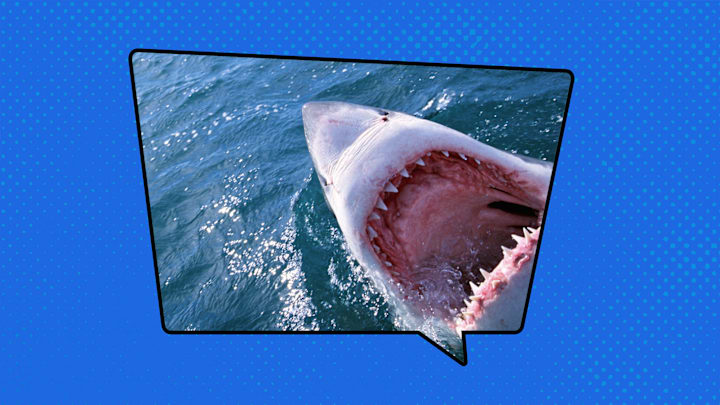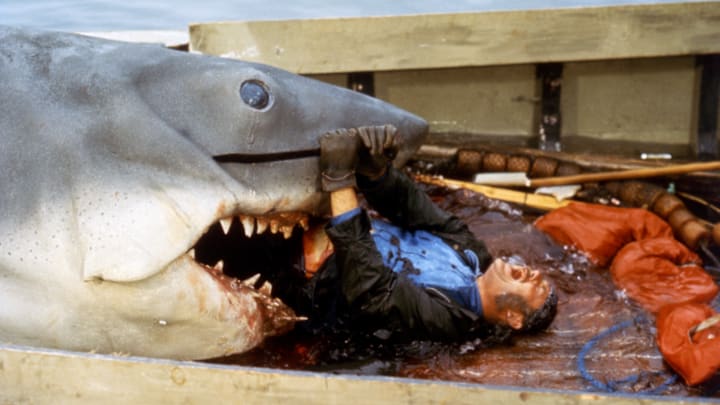Steven Spielberg Is Sorry That ‘Jaws’ Caused a Shark Panic
It’s no secret that movies have the ability to radically impact popular culture, and not always for the better. In the case of Jaws (1975), which depicts a ravenous great white getting vacationers stuck in its teeth, it meant a surge in unfounded shark fears.
Nearly 50 years following the film’s release, director Steven Spielberg acknowledged his self-admitted culpability. “That’s one of the things I still fear, not to get eaten by a shark, but that sharks are somehow mad at me for the feeding frenzy of crazy sport fishermen that happened after 1975,” Spielberg said on “Desert Island Discs” in 2022. “I truly, and to this day, regret the decimation of the shark population because of the book and the film.”
Jaws was based on the bestselling 1974 novel by Peter Benchley. Both the source material and the film—which was for a time the highest-grossing movie in Hollywood history—made a mental imprint on the general public that sharks were bloodthirsty beasts. Some have blamed it for the rise in shark fishing, either to capture their valuable fins or for sport, though it’s not clear the film had a direct influence.
Speaking with CBS News in July 2022, psychologist Gabriella Hancock said that people are “not innately afraid of sharks” and that fear of them is “learned and socially enforced.” The major culprit may be what mental health professionals have dubbed “The Jaws Effect,” with audiences assuming sharks are as voracious as the one seen in the film.
Jaws isn’t solely responsible: Mass fear of sharks dates back to at least 1916, when a spate of attacks in New Jersey resulting in four deaths made national headlines. But such was the indifference to the predator that some people believed sea turtles were to blame. (The incident inspired Benchley to write his novel.)
The occasional rampage aside, sharks don’t find humans particularly interesting. The Florida Museum of Natural History recorded just 47 unprovoked bites worldwide in 2024, with four fatalities stemming from those unprovoked attacks.
And despite its reputed carnage, Jaws wasn’t nearly as gruesome as you might remember. It received a PG rating—although, to be fair, PG-13 ratings weren’t introduced by the Motion Picture Association of America (MPAA) until nine years after the film’s release, in 1984.
You may also like...
1986 Cameroonian Disaster : The Deadly Cloud that Killed Thousands Overnight

Like a thief in the night, a silent cloud rose from Lake Nyos in Cameroon, and stole nearly two thousand souls without a...
Beyond Fast Fashion: How Africa’s Designers Are Weaving a Sustainable and Culturally Rich Future for

Forget fast fashion. Discover how African designers are leading a global revolution, using traditional textiles & innov...
The Secret Congolese Mine That Shaped The Atomic Bomb

The Secret Congolese Mine That Shaped The Atomic Bomb.
TOURISM IS EXPLORING, NOT CELEBRATING, LOCAL CULTURE.

Tourism sells cultural connection, but too often delivers erasure, exploitation, and staged authenticity. From safari pa...
Crypto or Nothing: How African Youth Are Betting on Digital Coins to Escape Broken Systems

Amid inflation and broken systems, African youth are turning to crypto as survival, protest, and empowerment. Is it the ...
We Want Privacy, Yet We Overshare: The Social Media Dilemma

We claim to value privacy, yet we constantly overshare on social media for likes and validation. Learn about the contrad...
Is It Still Village People or Just Poor Planning?

In many African societies, failure is often blamed on “village people” and spiritual forces — but could poor planning, w...
The Digital Financial Panopticon: How Fintech's Convenience Is Hiding a Data Privacy Reckoning

Fintech promised convenience. But are we trading our financial privacy for it? Uncover how algorithms are watching and p...




